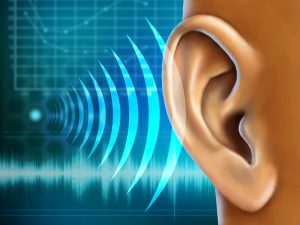 Following brain injury, hearing impairment can be a potential contributory factor to the person’s difficulty with communication:
Following brain injury, hearing impairment can be a potential contributory factor to the person’s difficulty with communication:
- The person’s hearing may be damaged as a consequence of the injury. Hearing impairment may be bilateral (affecting both ears), or only one ear may be affected, especially if the injury is sustained because of trauma (the trauma potentially damaging hearing on the injured side).
- The person may have a hearing impairment which predates their injury. Hearing impairment is very common and the incidence increases with age. More than 70% of people over 70 years and 40% of people over 50 years have some kind of hearing loss according to Action on Hearing Loss. If hearing impairment has been identified prior to brain injury and recommendations for management made (e.g. hearing aids), the person may require additional support to manage the impairment post injury. Referral to audiology for reassessment of hearing ability following brain injury is indicated.
- It is possible that the person may have had a pre-existing hearing impairment which remained undiagnosed prior to brain injury. This impairment may have a significant impact on communication following brain injury. The person may be less able to cope with the loss, mask its impact and/or use compensatory strategies (e.g. by paying extra attention, using non-verbal cues to facilitate communication) after brain injury.
It is important that any suspected hearing impairment is thoroughly investigated. This may include checking the ears for wax and a referral to audiological services as necessary.
It may be easy to overlook hearing impairment. Hearing problems may be:
- Misidentified as attentional deficits or other cognitive problems.
- Believed to be attributable to the impact of dysphasia.
- Wrongly assumed to be related to behavioural difficulties.
- Thought to be due to lack of interest in communication.
- Misattributed as depressive illness.
Brain injury may cause an auditory processing disorder. This is a neurological processing problem and should not be confused with hearing loss. An auditory processing problem cannot be remediated by hearing aids.
The brain injured person themselves may not be aware of having a hearing impairment, especially if there is significant cognitive impairment including difficulties with insight. It may be that other people begin to suspect a hearing loss.
It is important that hearing impairment is recognised and addressed in order to effectively support the person’s communication. Not addressing the hearing impairment can have a significant impact on the person affected, further exacerbating problems caused by brain injury. Failure to address hearing problems can:
- Affect the person’s ability to benefit from care and rehabilitation.
- Affect the person’s ability to manage assessment post brain injury. Therefore, they may appear less able than they actually are. Assessment results are likely to be inaccurate.
- Increase confusion and distress.
- Affect the person’s ability to pay attention.
- Contribute to elevated levels of fatigue. Increased effort required to focus on, hear, and process speech results in cognitive fatigue and a decrease in ability and motivation to maintain attention.
- Further exacerbate any language comprehension difficulties arising from dysphasia.
- Contribute to a sense of isolation.
- Exacerbate depression and anxiety.
The person with hearing impairment is likely to have additional difficulties whilst attempting to communicate in busy, noisy environments. This is likely to be exacerbated if the person also has attentional and information processing impairments. The person may also experience feelings of overwhelm and distress if unable to manage such environments which is likely to exacerbate any additional communication impairments.
Tinnitus (the perception of sound when there is no actual noise in the environment) is often associated with hearing loss and may occur following:
- Brain injury.
- Repeated exposure to loud noise.
- Exposure to extreme loud noise (e.g. associated with blast injury).
Sounds perceived may be described as buzzing, ringing, whistling, whining, hissing etc. The sounds may be intermittent or persistent and be of one pitch or varied. The person with brain injury may find tinnitus distressing and confusing.
Vertigo (dizziness, sensations of spinning/rotation and possible nausea) may occur following brain injury. Vertigo may or may not be associated with hearing loss and/or tinnitus.
A number of medical conditions (unrelated to brain injury) may be associated with vertigo and/or tinnitus. Appropriate audiological and/or medical referrals are indicated.
It is important that those who support people with brain injury are aware of the possibility of hearing impairment, tinnitus and vertigo. Suspected hearing impairment requires appropriate investigation, assessment and strategies implemented to support the person.